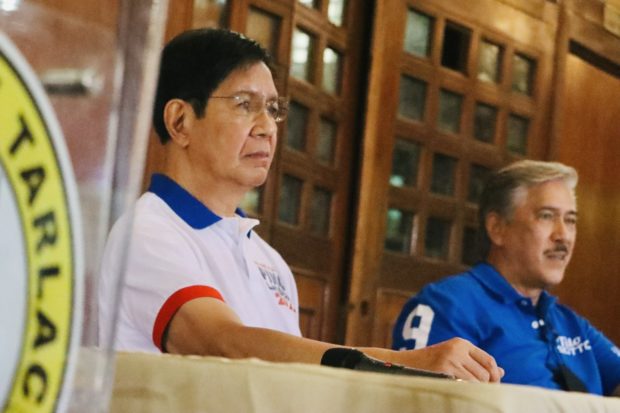Sotto: SC rules on terror cases give AFP, PNP more power to nab suspects

Former Senator Panfilo Lacson (left) and former Senate President Vicente Sotto III speak with reporters in a press conference in Tarlac city on Monday, April 25, 2022. (File photo from Lacson-Sotto media bureau)
MANILA, Philippines — The procedural rules issued by Supreme Court on anti-terrorism cases appear to be balanced.
This observation was expressed by former Senate President Vicente Sotto III on Tuesday.
He also noticed the rules give law enforcers more power in terms of immunity from suit when they apprehend suspects.
Law enforcers refer to members of Philippine National Police (PNP) and Armed Forces of the Philippines (AFP).
“It appears balanced. But the law gave arresting officers more liberty to arrest and file a violation of anti-terror law against suspected terrorists without the fear of being charged with an offense,” Sotto told reporters.
Nevertheless, the former Senate leader said as long as the rules do not make the Anti-Terrorism Act “weakest in the region,” he is fine with it.
Under the procedural rules set by the High Tribunal, a law enforcement agent is mandated to secure a written surveillance order from the Court of Appeals in order to secretly wiretap, listen to, read, and record any private communications between members of a judicially proscribed terrorist organization and any person charged with, or suspected of, committing any of the crimes defined and penalized under the law.
The rules likewise state a person suspected of violating the law can be arrested and detained without a judicial warrant of arrest.
The detention, however, cannot exceed the period provided under Article 125 of the Revised Penal Code, unless authorized in writing by the Anti-Terrorism Council.
For his part, former Senator Ping Lacson said he “couldn’t agree more with the SC ruling in its interpretation of the law.”
When he was chairman of Senate Committee on National Defense and Security in the 18th Congress, Lacson authored and sponsored Senate Bill Number 1083, otherwise known as the Anti-Terrorism Act.
The bill was signed into law on July 3, 2020.
“Aside from the other safeguards provided in the Anti-Terrorism Act of 2020 against possible abuse by law enforcement agents, we have effectively amended the Anti-Wiretapping Law, which only requires a regional trial court judge to authorize law enforcement officers to conduct technical surveillance on persons suspected of committing certain crimes,” said Lacson.
“As far as violations of the Anti-Terrorism Act, a division of Court of Appeals now has the authority to issue that judicial warrant,” the former senator explained.
He likewise noted the arrest and detention without a judicial warrant are “already allowed under existing jurisprudence.”
He said Supreme Court is “merely [extending] the allowable period of detention due to the unusual nature of the crime of terrorism.”